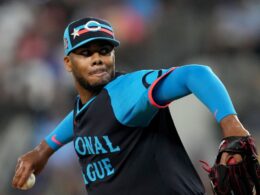Trying to keep potted herbs alive can be a challenge for even the most green-fingered.
But it seems that it may have little to do with gardening prowess – because the Mail can reveal that supermarket herbs are designed to thrive only until you get them home.
Experts say herbs grown in pots for large retail chains are really immature seedlings which are misleadingly presented as adult plants and cannot survive for long in a household setting.
To test the theory, the Mail bought coriander and basil potted herbs from Tesco, Asda, Morrisons, Sainsbury’s and Waitrose and cared for them according to the package instructions for a week.
We found many collapsed as soon as they were removed from their plastic packaging and several wilted, turned brown and/or lost leaves within days.


According to experts, supermarket herbs are grown to look good on shelves rather than survive at home (file photo)
Kendall Platt, gardening expert at Adventures With Flowers, said: ‘Supermarket herbs are grown to look good on the shelves, they are not grown to survive. When they die, you have to buy another.’
Herbs sold in supermarkets are grown in heated greenhouses in ‘ultimate’ conditions, often receiving 18 hours of artificial light a day.
‘This makes them grow tall quickly – but their size is misleading because they are still immature plants.
‘They grow big in about three weeks but you’re basically buying a pot of seedlings,’ said Liz Alderson, in her gardening blog The Herb Guide.
On the supermarket shelf, the weak stems of the immature herbs are held up by plastic packaging, which also raises the lushest-looking leaves to the top, making them look healthy. But once you remove the wrapper the weak stems can quickly collapse.
Seeds are also sown too closely together and not separated out when they germinate, which means seedlings are in competition with each other for space.
Ms Platt said: ‘In one pot you don’t get one plant, you can have as many as 50 tiny plants all competing for nutrients. There is not enough in the soil to sustain them.’

Weak stems of the immature herbs are held up by plastic packaging, which also raises the lushest-looking leaves to the top, making them look healthy – until they are unpacked (file photo)

Herbs are also outdoor plants, which means its hard to maintain their optimum conditions inside (file photo of a supermarket vegetable aisle)
As seedlings are exposed to so much artificial light in greenhouses, the plants grow tall and have small leaves because they don’t need to put in much effort to capture the light needed for energy.
But once you get them home, even the sunniest windowsill is unlikely to have anywhere near as much light so the herbs struggle to get the energy they need.
Ms Platt added: ‘Herbs are really outdoor plants and it is difficult to maintain the conditions they need inside.
‘People over-water them when they start to wilt, which can drown them.’
Andrew Opie of the British Retail Consortium, which represents supermarkets, said: ‘Retailers conduct shelf-life trials to ensure that [potted herbs] are fit for purpose and are of the highest quality for customers.
‘Herbs are also grown in greenhouses that use light and heat to grow herbs in optimal conditions so retailers can offer British potted herbs all year around.’









